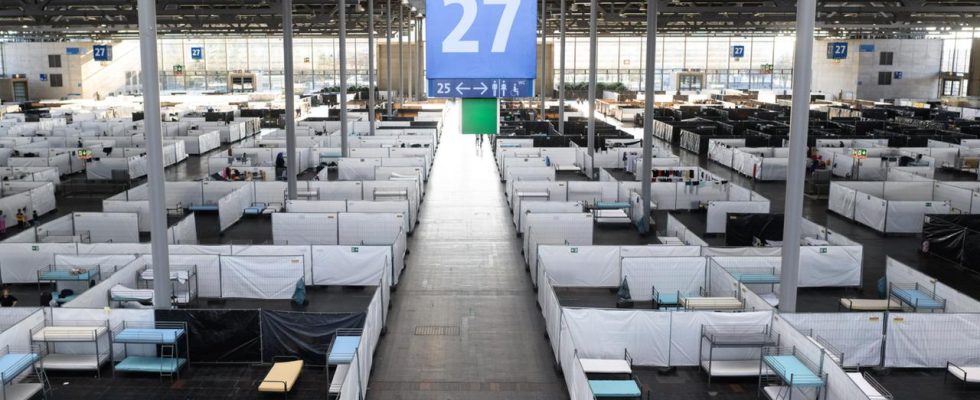For weeks, the countries have been pushing for more money for the accommodation of refugees. Before the meeting in the Chancellery next week, the federal government apparently wants to be prepared – and has done the math.
The top meeting in the Chancellery is scheduled for next week. At the so-called refugee summit of the federal and state governments, there is a struggle over the distribution of the costs. The federal states have long been demanding more money from the federal government for the accommodation, care and integration of the refugees.
The federal government rejects the demands. Finance Minister Christian Lindner told the “Rheinische Post” in April that the federal government was already providing massive support to the federal states, for example paying the living expenses of refugees from Ukraine, although the federal states were actually responsible. In addition, the federal states are in better financial shape than the federal government, which had to take on large debts due to the crises. “In this respect, the federal government should actually ask the federal states for support and not vice versa,” said Lindner. However, the finance minister met with little understanding from the federal states with such statements.
26.65 billion euros for 2023
In the run-up to the “refugee summit” in the Chancellery, the federal government is apparently trying to prepare itself by collecting facts. Last week, the Federal Ministry of Finance, at the request of the ARD Capital Studios lists how high the refugee-related expenditures of the federal budget are for the years 2022 and 2023.
According to this, the federal level spent a total of 29.84 billion euros on this in 2022. In 2023 it should be around 26.65 billion. However, this includes all costs that the federal government associates with refugees. In 2023, for example, more than ten billion euros for combating the causes of flight.
The reasoning of the Ministry of Finance: States and municipalities should not be left alone to deal with this “extraordinary situation”, “although the admission, accommodation and care of refugees is the responsibility of the states according to our constitution”.
“Drastic revenue shift”
On the basis of these figures, however, another list was created in the government that ARD Capital Studio could see. It describes in detail how the federal government is already supporting the federal states with refugee costs. It is pointed out that in the past there has been a “dramatic shift in revenue to the detriment of the federal government”. The federal government’s share of total tax revenue has fallen by ten percentage points over the past 30 years. In 2021 it was less than 38 percent.
As a result, states and municipalities would have received the income they needed to carry out their tasks. As a result, the federal government foregone additional tax revenue of 86 billion euros in 2021 alone. In addition, the federal government spent almost 25 billion euros on state tasks in 2021.
Deficit here, surplus there
Reference is also made to the different budgetary situations at the federal and state levels. While the federal states and municipalities made surpluses as a whole, the federal government had to take on new debts. In 2022 he accumulated a deficit in the three-digit billion range for the third time in a row. The federal states and municipalities, on the other hand, would have achieved surpluses again as early as 2021, and all municipalities even consistently since 2012.
When it comes to financing refugee costs, the situation is also not comparable to 2016. A total of 15.6 billion euros are being contributed and an additional four billion for the costs of accommodation. In 2016 it was a total of 11.1 billion euros.
The message of the compilation is clear. The federal government sees its ability to help the states and municipalities at the end. The countries at the “refugee summit” can probably not count on more money. The federal government is sticking to its line. At the weekend, Federal Interior Minister Nancy Faeser Report from Berlin I said it’s not always about financial issues. The countries will probably see it differently.

